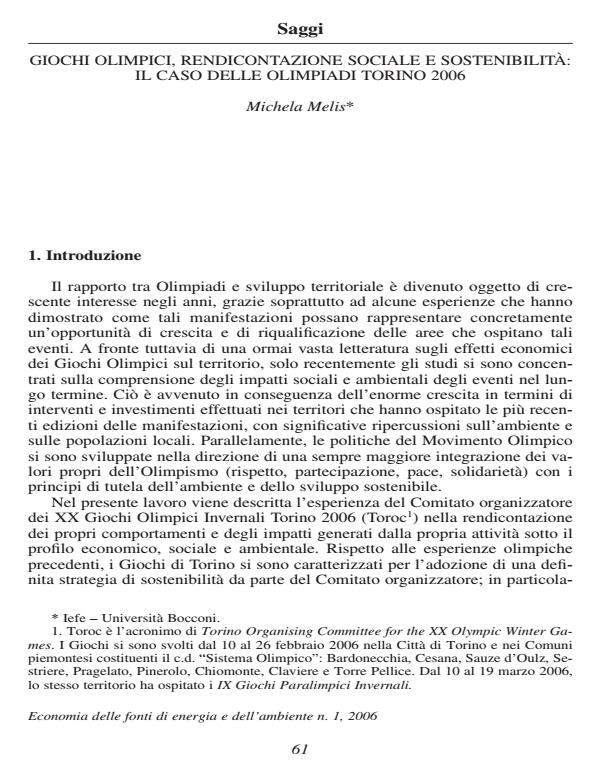Giochi olimpici, rendicontazione sociale e sostenibilità: il caso delle Olimpiadi di Torino 2006
Journal title ECONOMIA DELLE FONTI DI ENERGIA E DELL’AMBIENTE
Author/s Michela Melis
Publishing Year 2007 Issue 2006/1 Language Italian
Pages 32 P. 61-92 File size 188 KB
DOI
DOI is like a bar code for intellectual property: to have more infomation
click here
Below, you can see the article first page
If you want to buy this article in PDF format, you can do it, following the instructions to buy download credits

FrancoAngeli is member of Publishers International Linking Association, Inc (PILA), a not-for-profit association which run the CrossRef service enabling links to and from online scholarly content.
The organisation of the Olympic Games can have multiple impacts on a host city or region: there can be physical, economic, environmental, social, cultural, political impacts. Although it is widely accepted that such mega-events may have a large impact on and leave an important legacy to the host city and region, the Olympics have not been part of the sustainability debate so far. This paper examines the experience in sustainability reporting of the last Olympic Winter Games, held in Torino in February 2006: compared with previous Games, Torino Olympics were characterized by a structured and well-defined sustainability strategy, whose reporting process turns out to be useful in analysing and discussing the opportunities and risks for hosting areas related with the organisation of the events. The paper is organised as follows. Section 2 highlights some key environmental and social issues related with the organization and the carrying out of the events. Hosting the Games is a task that calls for the planning and implementation of a series of activities and interventions throughout the territory. It requires a strong commitment with respect to all the parties involved in the organisation of the Games, to the areas concerned with the competitions, and to the local community and its expectations, in order to carry out the events as well as possible, minimizing the environmental impacts and leaving the territory with a positive material and immaterial legacy at the end. Section 3 offers a brief summary of the Olympic Movement sustainability policies. Since the nineties, the promotion of sustainable development has become one of the fundamental goals of the Olympic Movement. The inclusion of a dedicated paragraph in the Olympic Charter stresses the importance of holding Olympics in conditions showing a responsible attitude towards environmental and social issues. Section 4 and 5 review and discuss Torino Olympics sustainability reporting project, whose goal was to gather and describe, from 2003 to 2006, the path followed and commitment made for this purpose by the Organising Committee of the Games (Toroc). The project aimed at measuring, evaluating, communicating and improving the environmental and social performance of the Committee, analysing the impact on the territory of the activities carried out, the ethical level of organisational behaviour, and the level of involvement and dialogue with stakeholders. Stakeholder involvement in particular was a crucial part of the process, as it was aimed at increasing effectiveness of reporting, and ensuring that decisions reflect the diverse interests of the different categories of stakeholders involved. Within the stakeholders to whom the report was addressed, the paper focuses in particular on local institutions, in order to highlight the importance of the collaboration and interaction of the various parties involved in the organisation of the Games, and local community, describing the activities and efforts made for the protection, enhancement and development of the territory being concerned and its inhabitants. Recommendations for responsible public authorities, next Olympic Games (and large-scale events) organisers and social and economic actors involved are discussed in the conclusion.
Michela Melis, Giochi olimpici, rendicontazione sociale e sostenibilità: il caso delle Olimpiadi di Torino 2006 in "ECONOMIA DELLE FONTI DI ENERGIA E DELL’AMBIENTE" 1/2006, pp 61-92, DOI: